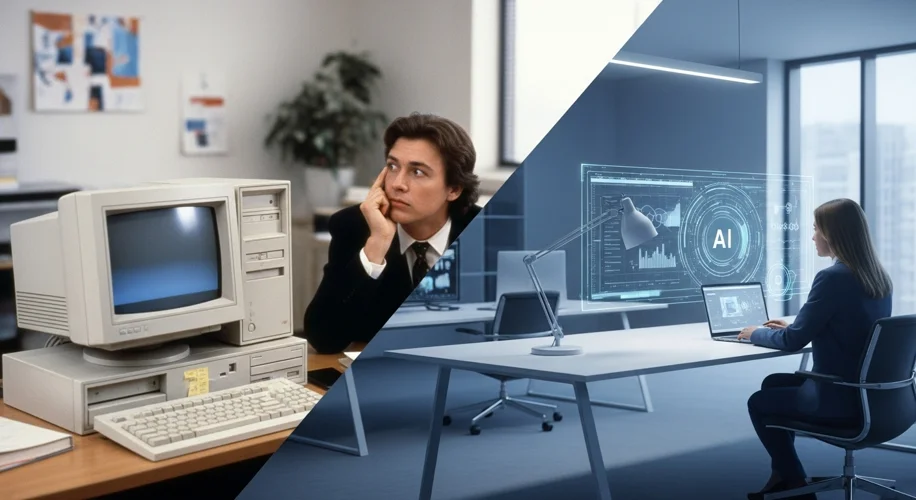So, have you been following all the AI talk lately? It’s everywhere, right? From ChatGPT helping write emails to algorithms predicting pretty much everything. Some folks are saying it’s going to totally change the world, make us super productive, even usher in an era of abundance.
Then, I saw this headline the other day: a top economist suggested the current AI boom is more overhyped than the 1990s dot-com bubble. That caught my eye. More overhyped? Really? It got me thinking about something pretty similar that happened not so long ago, back when many of us were either kids or just starting our careers.
Remember the Clunky Beige Boxes?
Think back to the late 80s and 90s. Personal computers were making their big splash. They were popping up in offices, homes, schools. We were told these magical machines would make us incredibly efficient, that productivity would skyrocket. And honestly, it felt like they should. Suddenly, you could type reports without carbon paper, send faxes from your desk, play Minesweeper… it was amazing!
But here’s the funny thing: economists back then, smart folks like Robert Solow (who even won a Nobel Prize!), looked around and scratched their heads. Despite all the money businesses were pouring into these newfangled computers and IT systems, the national productivity numbers just weren’t budging. Like, at all. It was the famous ‘productivity paradox’: “You can see the computer age everywhere but in the productivity statistics.”
It was a real head-scratcher. Everyone knew computers were powerful, yet the big, measurable economic gains just weren’t showing up. There was a lot of hype, yes, and then, eventually, the dot-com bust reminded everyone that new tech doesn’t always guarantee instant riches or societal transformation.
The Long Game of Transformation
So, what does that old story tell us about AI today? Well, it turns out, those computers did eventually deliver on their promise, and then some. But it wasn’t instant. It took time. Lots of it.
Think about it:
- Learning Curve: People had to learn how to use these machines, not just for basic tasks, but to fundamentally change their workflows.
- Business Rethink: Companies couldn’t just drop a PC on every desk. They had to totally reorganize their processes, redesign their operations, and even invent new business models around the technology.
- Complementary Innovations: The real magic happened when computers connected to the internet, when software became user-friendly, when new industries (like e-commerce!) were born that leveraged the tech.
- New Generations: A whole generation grew up with computers as second nature, integrating them seamlessly into everything they did.
It wasn’t just about plugging in a computer; it was about totally rewiring how we worked, thought, and even socialized. That took decades, not just a few years.
Where We Are Now with AI
Fast forward to today, and it feels a bit like we’re in a similar spot with AI. We’re seeing incredible demos, hearing wild predictions, and yes, there’s a definite hype cycle in full swing. There’s also that underlying hum of worry: What about jobs? Will AI take over everything?
If the past is any guide, we can expect a few things:
- Hype and Disillusionment: We’ll likely see the initial excitement cool off a bit before the real, deep impact becomes clear. Not every AI startup will be a Google, just like not every dot-com was an Amazon.
- Productivity Lag: We might not see massive, immediate jumps in overall economic productivity. Why? Because, like the PC, AI isn’t just a tool; it’s a fundamental shift. We’re still figuring out the best ways to integrate it, to restructure businesses around it, and to develop the new skills needed.
- Job Evolution, Not Just Displacement: Yes, some jobs will change, and some might disappear. That’s a painful part of any major technological transition. But history also shows us that new technologies create entirely new roles and industries we can’t even imagine right now. We’ll need “AI prompt engineers” and “AI ethicists” and jobs that combine human creativity with AI capabilities.
The Human Element is Key
The long-term impact of AI isn’t just about the algorithms themselves. It’s about how effectively we, as humans and as a society, manage this transition. It’s about skill development, about rethinking our economic structures, and about letting go of old ways of doing things to embrace new ones.
So, next time you hear about AI, remember those clunky old PCs. They might not have delivered instant productivity, but they laid the groundwork for the digital world we live in today. AI is likely on a similar journey – a marathon, not a sprint, with its biggest impact still many years down the road. It’s exciting, a little scary, and definitely a story still being written.

